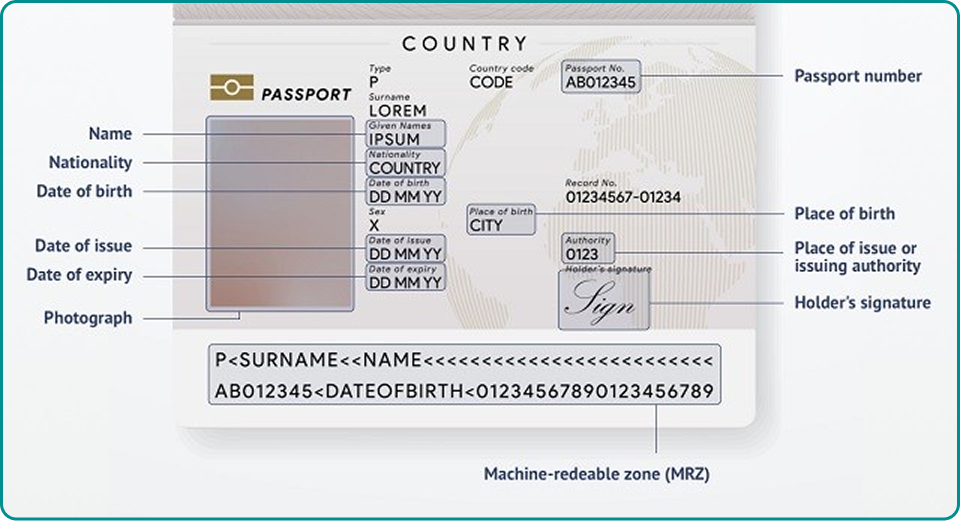Table of Contents
ToggleIn today’s globalized and digital-first business environment, robust identity verification is non-negotiable. Passport verification stands as a cornerstone of secure identity authentication, enabling organizations to mitigate risks, ensure regulatory compliance, and build trust with clients and partners.
In 2025, with advanced technologies and stricter regulations shaping the landscape, understanding passport verification is essential for businesses operating across borders or in regulated industries. This article explores the definition of a passport and passport number, the mechanics of passport verification, and its strategic importance for enterprises.
What Is a Passport?
A passport is a state-issued identification document that authenticates an individual’s identity and nationality, enabling travel abroad and acting as a universally accepted form of identification. A passport holds essential information like the name of the holder, date of birth, nationality, photograph, and security markings to avoid counterfeiting. For companies, passports are a reliable source for validating customer or employee identity during onboarding, payment transactions, or international operations.
What Is a Passport Number?
A passport number is an alphanumeric identifier given to each passport by the issuing authority. The number, usually found on the data page of the passport and in the machine-readable zone (MRZ), is used as an important reference when tracking and authenticating the document’s validity. Companies use passport numbers to cross-check against international databases, confirming that the document is not fraudulent or linked to malicious activity.
What Is Passport Verification?
Passport verification is the act of verifying a passport to ensure its validity and the identity of the holder. It entails checking the document’s security features, confirming its details (such as the passport number) against authoritative databases, and verifying that the presenter is consistent with the passport data. This is part of ensuring secure processes in sectors like finance, travel, and human resources.
Key Elements of Passport Verification
- Document Authenticity: Check of security features like holograms, microtext, UV features, and the MRZ for any signs of tampering or counterfeiting.
- Data Validation: Passport information verification, passport number specifically, against records of issuing authorities or global databases such as Interpol’s Stolen and Lost Travel Documents (SLTD).
- Biometric Authentication: Match of biometric information (e.g., facial recognition, fingerprints) embedded in the passport’s chip with the live biometrics of the individual.
- Identity Verification: Verifying that the person is the match for the passport’s picture and information, usually using sophisticated biometric technology.

How Passport Verification Works in 2025
Technology has made passport verification both more efficient and secure. The process generally follows these steps:
- Document Presentation: Individuals submit their passport in physical (e.g., at airports) or digital (e.g., secure upload to a platform) form.
- Data Reading: Optical Character Recognition (OCR) technology scans key information, including the passport number, from the MRZ or visual inspection zone.
- Security Feature Inspection: Artificially intelligent algorithms evaluate security features to detect the presence of counterfeit indicators, like anomalies in holograms or fonts.
- Biometric Verification: In the case of e-Passports, internal chips are read to compare biometric information (e.g., facial or fingerprint scans) against the presenter.
- Database Verification: The passport number is checked against international databases to ensure it is not lost, stolen, or revoked.
- Instant Results: Verification results are provided in real-time, allowing for quick decisions on behalf of businesses.
Why Passport Verification Is Essential for Businesses in 2025
Passport verification is a tactical business asset, catering to fundamental business needs in security, compliance, and operational efficiency. The following are the main reasons why it is a must:
1. Reducing Identity Fraud Risks
Identity fraud is a major risk to companies, with criminals using counterfeit passports to commit financial crime or unauthorized activities. Intelligence-powered verification systems driven by AI and biometrics allow organizations to accurately identify fake documents, protecting assets and reputation.
2. Promoting Global Security
In an age of increased anxiety about terrorism, human trafficking, and illegal cross-border transactions, passport authentication is vital for safe operations. Having access to Interpol’s SLTD database, which has millions of entries, enables companies to authenticate passport numbers and block unauthorized transactions or access. Sharing real-time global data enhances enterprise security systems.
3. Simplifying Travel and Immigration Procedures
For travel and hospitality businesses, automated passport checks through e-gates and biometric kiosks cut processing times and maintain high security standards. This maximizes customer satisfaction and business efficiency at airports, hotels, and other travel points of contact.
4. Facilitating Regulatory Compliance
Know Your Customer (KYC) and Anti-Money Laundering (AML) compliance is required of financial institutions, fintech platforms, and other regulated sectors. Passport verification, such as passport number validation, forms a backbone of KYC procedures that allows businesses to securely onboard clients and comply with mandates like the EU’s AMLD6 directive in 2025.
5. Supporting Digital Transformation
As companies move to digital-first operations—covering online banking, remote recruitment, and internet-based commerce—secure authentication requirements are critical. Passport authentication streamlines remote confirmation, decreasing dependency on face-to-face processes and user and employee satisfaction.
6. Safeguarding Data Privacy and Security
With data breaches a real threat, secure passport verification protects sensitive data, including passport numbers and biometrics, from irresponsible handling. Technologies such as zero-knowledge proofs and decentralized identity systems enable organizations to authenticate identities without revealing irrelevant data, in compliance with regulations such as GDPR and CCPA.
Challenges Facing Passport Verification for Companies
Partially because of its advantages, passport verification has challenges that companies need to overcome:
- High-Tech Forgery Methods: Criminals utilize sophisticated techniques, including 3D printing, to forge passports, and thus the need for state-of-the-art detection systems.
- Compliance with Data Privacy: Storage and collection of personal and biometric data are subject to strict privacy laws, which create legal and ethical dilemmas.
- Interoperability Worldwide: Differences in passport standards between nations complicate the verification of processes for multinationals.
- Technology Access Disparities: Smaller entities or those in emerging markets might not have access to sophisticated verification infrastructure, thus exposing them to vulnerabilities.
The Future of Passport Verification for Businesses
In the future, passport verification will keep improving, presenting new business opportunities:
- Decentralized Identity Solutions: Decentralized blockchain-based systems will provide secure, user-managed identity verification with less dependence on centralized databases.
- AI and Machine Learning Innovation: Smarter algorithms will enhance fraud detection by recognizing patterns and anomalies in real time.
- Multimodal Biometrics: The integration of face recognition with other biometrics, for example, voice or iris scans, will boost verification accuracy.
- International Standardization: Efforts such as the International Civil Aviation Organization’s (ICAO) Digital Travel Credential (DTC) will simplify verification across the globe.
Conclusion
Passport verification in 2025 is an indispensable tool for companies operating in a complicated international setting. By verifying passports and their respective passport numbers, organizations can reduce fraud, ensure compliance, and maximize operational efficiency.
As technologies such as AI, biometrics, and blockchain evolve further, passport verification will be made simpler and more secure, enabling businesses to establish trust and succeed in a digital-first economy. Investing in strong verification solutions is not only a requirement—it’s a business strategy for companies to remain competitive in 2025 and beyond.





Leave a Reply